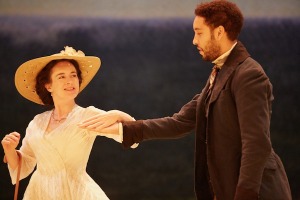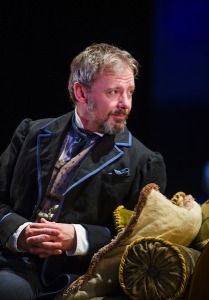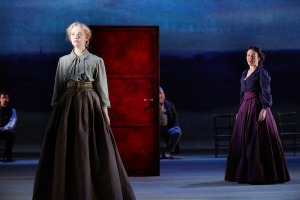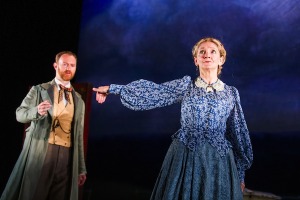A fruitful distillation of old and new
by Mika Provata-CarlonePatrick Marber’s Three Days in the Country at the National Theatre.
“A ripe-soft pear” was Gustave Flaubert’s term of affection for his good friend Ivan Turgenev. Taken out of context, the term is hardly a compliment. Une poire molle is someone who lacks character, conviction, mettle; yet Flaubert must have meant something very different. According to another good friend, Henry James, Turgenev was quite at ease with this “expansive softness, [this] comprehensive indecision, which pervaded his nature, just as it pervades so many of the characters he has painted. He enjoyed Flaubert’s use of this term, good-naturedly opprobrious, more even than Flaubert himself, and recognised perfectly the element of truth in it”. For it meant something more vital than determination and perhaps action: for Henry James, it evinced “light, easy, human intelligence”, a “combination of beauty and reality”.
Patrick Marber’s Three Days in the Country currently at the National Theatre is a lucid, crisp version of Turgenev’s comedy of manners A Month in the Country that brings forth precisely these qualities in Turgenev and his work, as well as being a powerful statement that the old can be new – and that the truly new can be nothing if not old.
Marber’s production is ingenious and highly skilful. We savour the comedy, the fast pace, the spirited exchanges, and remain keenly focused on the quiet hues of meaning and of staging.”
Turgenev’s play is deceptively simple: Natalia Petrovna (Amanda Drew) is too young and too urban to be happily married and to live in the country. With echoes of Emma Bovary, she flirts inconsequentially with a family friend, Mikhail Rakitin (John Simms), a true, and irresistibly attractive, poire molle. She is surrounded by a good husband, a mother-in-law, companions, a solicitous misdiagnosing doctor, a son, an elderly tutor and a young ward, some servants. Then, for one glorious, tempestuous, passionate summer month, a young tutor joins the estate. He brings youth, charm, a torrent of radical ideas and much confusion and entanglements. The play begins with aristocratic ennui, and ends in riotous return to a seemingly similar state of boredom.
Yet much has been broken from first to last scene. What was real in the first act is but a ghost of reality at the end of the fifth: not only in the lives of the characters, but especially in the life of Turgenev’s nation, in the life of fin-de-siècle Russian society. Turgenev writes before Chekhov or Gogol, his tone is lighter and his style more vivid and complicit, yet what he gives us as historical and social commentary already foreshadows their vision and conclusions. Russia is at a turning point, in despair and in torpor at the same time. The old guard refuses to question, and the younger generation is incapable of believing in something other than the total eradication of everything old. Conservatism and nihilism clash quietly in Turgenev’s play, as do fiery passion and true love.
Marber’s production succeeds in giving us precisely this sense of spectacle and contemplation at the same time. His reduction of the play to a little over two hours (almost half the duration of the original play) is ingenious and highly skilful. We savour the comedy, the fast pace, the spirited exchanges, and we also remain keenly focused on the quiet hues of meaning and of staging. There is richness and minimalism combined in Mark Thompson’s stage design, which echoes Frederick Ashton’s ballet adaptation more than it does Turgenev’s stage directions, as well as referencing ancient drama in the choric arrangement of 13 chairs in the background for any characters without stage action.
These sitting figures give us a gripping sense of being silent witnesses to the looming future, as well as being symbolic of the removal of boundaries. Exteriors become interiors, the intimate and private are now public, the psychological is the new real, masters and servants will be one and the same. The inevitability of historical and social fusion, of the breaking down of the walls of consciousness, is heightened by transparent panels suspended above the centre stage and the wings – ghosts of division, but also vehicles of a clearer insight and even a certain voyeurism.
Anyone who dares to love you threatens the purity of your self-loathing’ is Rakitin’s accusation against Natalia Petrovna, adding ‘you haven’t been kicked to death by love’s black boot’ as a repartee.”
The interplay between limits and limitlessness is stressed by the seamless piece of canvas stretching from the stage all the way to the background: a poignant evocation of Russian impressionist painting and of an idealised, evanescent homeland. Ripe rye colours dominate the front stage, rising into a mole-grey strip of land, Prussian blue forests and a nebulous sky in the tradition of Levitan or Serov.
There is a mysterious red door, industrial in style and ragged in state, suspended in front of the two central panels, before it lands determinedly on the stage for the last act. We are told that this is the “customary place of assignations” in Russian estates, but it is also a reminder of the désir du non-désir, of the irresistible allure for 19th-century writers of all that was tempting and impossible – rather than of what was desirable and possible. In Marber’s scheme, no adult character enters or exits through the red door, only the ten-year-old boy Kolya will appear behind it in a fine twist of expectations.
Turgenev explores love as a condition of the psyche, as a life-state rather than a physical passion, enhancing the drama of the characters’ situation as well as exposing the triviality of their perception of their own predicaments. “Anyone who dares to love you threatens the purity of your self-loathing” is Rakitin’s accusation against Natalia Petrovna, adding “you haven’t been kicked to death by love’s black boot” as a repartee on another occasion. Then there is the priceless exchange between Lizaveta (Debra Gillett), the companion of Natalia Petrovna’s mother-in-law, and the doctor Shpigelsky (Mark Gatiss) who has proposed to her with magnificent panache and hilarious acrobatics as he tries to overcome an attack of lumbago: “I can live with my unhappiness; I don’t want to live with yours,” she says, and Chekhov or Gogol, or Ibsen, would have left it at that. Not Turgenev: “Is that it?” the doctor retorts mightily perplexed.
“Everyone is a joke they don’t get,” says Rakitin early in the play, and this is Turgenev’s most powerful tool, in his prose as well as in his plays: through delicate or not so delicate comedy he achieves what Georg Brandes called “aristocratic radicalism”. Comedy also allows for an impersonal engagement with life and art, a detachment which is nonetheless replete with profound humanity. For Ernest Renan speaking at the Gare de Lyon before Turgenev’s remains began their journey back to Russia, this impersonality enabled a “conscience [that] was not that of an individual to whom nature had been more or less generous: it was in some sort the conscience of a people. Before he was born he had lived for thousands of years.” One might say that Marber’s production has such a sense of timelessness that is filled with time.
It also has the softness Flaubert recognised in Turgenev, the tenderness Henry James saw in him. Turgenev gives us comedy without ridiculing or lampooning his characters, he is critical without being harsh. His theme of tutors and the temptation they bring or the radical changes they cause is allowed to carry its full weight. Unlike Molière’s bourgeois gentilhomme, none of the characters lose their balance or their dignity, nor does the tutor himself suffer the fate of Lenz’s hero in The Advantages of Private Education, a play Brecht will rewrite as The Tutor.
There are strong, enticing performances throughout in Marber’s production, with echoes from older versions given new life. The only awkward choice is perhaps Cherrelle Skeete, her striking profile clashing uncomfortably with her rather extravagant acting. A particularly beautiful element are the songs, which are sung in Russian, and remind us that the “incorrigible Westerner”, as Turgenev called himself, was deeply and unshakeably in love with the traditions and the voice of his country: he will write in Senilia that “In days of doubt, in days of anxious thought on the destiny of my native land, thou alone art my support and my staff, O great powerful Russian tongue, truthful and free! If it were not for thee how should man not despair at the sight of what is going on at home?”
Turgenev’s recurrent themes are long-lost love, unattainable dreams, a hesitance before destiny and the future; a malaise towards the weight of the past and history. In Three Days in the Country we catch a fine glimpse of his power to tell a story, not through the plot, as he insisted, but based on the characters who in his hands, through his words, came to life. Marber is a faithful servant to Turgenev’s original as well as a profoundly original playwright, and this is a performance to relish, in a new and very old-fashioned way.
 Mika Provata-Carlone is an independent scholar, translator, editor and illustrator, and a contributing editor to Bookanista. She has a doctorate from Princeton University and lives and works in London.
Mika Provata-Carlone is an independent scholar, translator, editor and illustrator, and a contributing editor to Bookanista. She has a doctorate from Princeton University and lives and works in London.
Three Days in the Country continues at the National Theatre to Wednesday 21 October. Read more.
Patrick Marber’s playscript is published by Faber & Faber. Read more.





